河北省大厂回族自治县大厂回民中学高二英语上学期期中试题
- 格式:doc
- 大小:206.00 KB
- 文档页数:12

【高二】高二英语上学期期中联考试卷及答案(全卷满分:150分完成时间:120分钟)第一部分:听力(每小题1.5分,共30分)第一节(共5小题;每小题1.5分,满分7.5分)听下面5段对话。
每段对话后有一个小题,从题中所给的A,B、C三个选项中选出最佳选项,并标在试卷的相应位置。
听完每段对话后,你都有10秒钟的时间来回答有关小题和阅读下一小题。
每段对话仅读一遍。
1.How much did Richard pay for his ties?A. $40.B.$45.C.$50.2.What is the woman doing now?A. Teaching at school.B. Going into politics. C.Doing business.3.What does the woman suggest the man doing?A.Spending more time.B.Talking more with English speakers.C.Studying harder.4.How does David probably feel?A. Disappointed.B. Happy. C.Surprised.5.How long did the concert last?A.30 minutes. B.60 minutes.C.90 minutes.第二节(共15小题;每小题1.5分,满分22.5分)听下面5段对话或独白。
每段对话或独白后有几个小题,从每题所给的A、B、C三个选项中选出最佳选项,并标在试卷的相应位置。
听每段对话或独白前,你将有时间阅读各个小题,每小题5秒钟;听完后,各小题将给出5秒钟的作答时间。
每段对话或独白读两遍。
听第6段,回答第6至8题。
6.What does the man find hardest in learning English?A. Speaking.B. Writing. C.Listening.7.What does the woman suggest the man do about his listening? A.Listen to BBC English program.B.Buy a radio and listen to English Programs.C.Find an English pen friend.8.What had the man better do to improve his writing?A.Listen to BBC or VOA English program every day.B.Need a lot of practice.C.Find an English pen friend.听第7段,回答第9至11题。
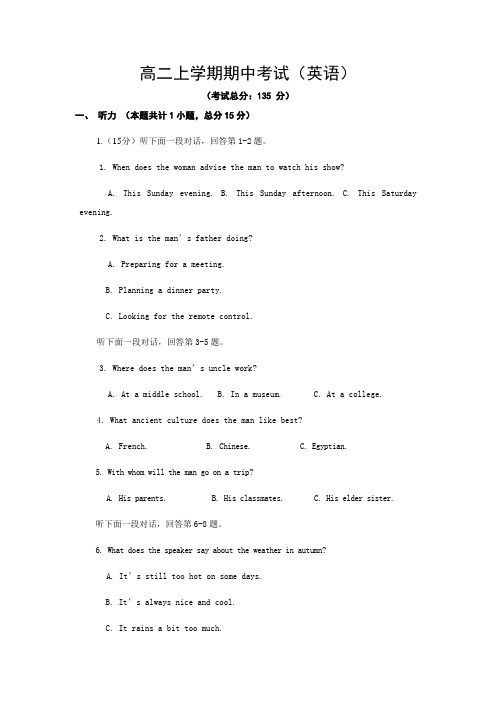
高二上学期期中考试(英语)(考试总分:135 分)一、听力(本题共计1小题,总分15分)1.(15分)听下面一段对话,回答第1-2题。
1. When does the woman advise the man to watch his show?A. This Sunday evening.B. This Sunday afternoon.C. This Saturday evening.2. What is the man’s father doing?A. Preparing for a meeting.B. Planning a dinner party.C. Looking for the remote control.听下面一段对话,回答第3-5题。
3. Where does the man’s uncle work?A. At a middle school.B. In a museum.C. At a college.4. What ancient culture does the man like best?A. French.B. Chinese.C. Egyptian.5. With whom will the man go on a trip?A. His parents.B. His classmates.C. His elder sister.听下面一段对话,回答第6-8题。
6. What does the speaker say about the weather in autumn?A. It’s still too hot on some days.B. It’s always nice and cool.C. It rains a bit too much.7. Which sport starts the earliest in a year?A. Basketball.B. Baseball.C. Football.8. When was the speaker born?A. In late November.B. In late October.C. In early October.听下面一段对话,回答第9-10题。
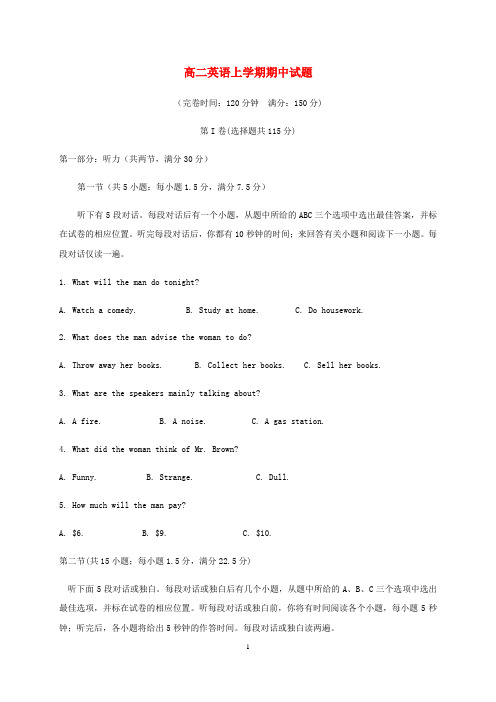
高二英语上学期期中试题(完卷时间:120分钟满分:150分)第I卷(选择题共115分)第一部分:听力(共两节,满分30分)第一节(共5小题:每小题1.5分,满分7.5分)听下有5段对话。
每段对话后有一个小题,从题中所给的ABC三个选项中选出最佳答案,并标在试卷的相应位置。
听完每段对话后,你都有10秒钟的时间;来回答有关小题和阅读下一小题。
每段对话仅读一遍。
1. What will the man do tonight?A. Watch a comedy.B. Study at home.C. Do housework.2. What does the man advise the woman to do?A. Throw away her books.B. Collect her books.C. Sell her books.3. What are the speakers mainly talking about?A. A fire.B. A noise.C. A gas station.4. What did the woman think of Mr. Brown?A. Funny.B. Strange.C. Dull.5. How much will the man pay?A. $6.B. $9.C. $10.第二节(共15小题;每小题1.5分,满分22.5分)听下面5段对话或独白。
每段对话或独白后有几个小题,从题中所给的A、B、C三个选项中选出最佳选项,并标在试卷的相应位置。
听每段对话或独白前,你将有时间阅读各个小题,每小题5秒钟;听完后,各小题将给出5秒钟的作答时间。
每段对话或独白读两遍。
听第6段材料,回答第6、7题。
6. What day is it today?A. Friday.B. Saturday.C. Sunday.7. What was David wearing on Wednesday?A. A blue shirt and black pants.B. A black shirt and gray pants.C. A blue shirt and gray pants.听第7段材料,回答第8、9题。
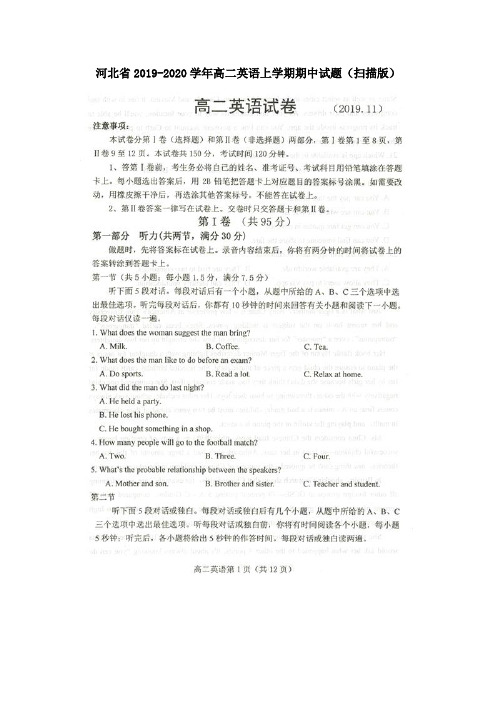
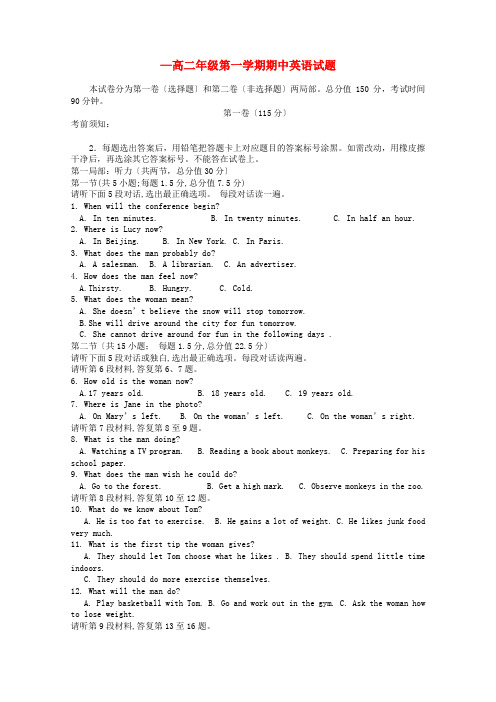
—高二年级第一学期期中英语试题本试卷分为第一卷〔选择题〕和第二卷〔非选择题〕两局部。
总分值150分,考试时间90分钟。
第一卷〔115分〕考前须知:2.每题选出答案后,用铅笔把答题卡上对应题目的答案标号涂黑。
如需改动,用橡皮擦干净后,再选涂其它答案标号。
不能答在试卷上。
第一局部:听力〔共两节,总分值30分〕第一节(共5小题;每题1.5分,总分值7.5分)请听下面5段对话,选出最正确选项。
每段对话读一遍。
1. When will the conference begin?A. In ten minutes.B. In twenty minutes.C. In half an hour.2. Where is Lucy now?A. In Beijing.B. In New York.C. In Paris.3. What does the man probably do?A. A salesman.B. A librarian.C. An advertiser.4. How does the man feel now?A.Thirsty.B. Hungry.C. Cold.5. What does the woman mean?A. She doesn’t believe the snow will stop tomorrow.B.She will drive around the city for fun tomorrow.C. She cannot drive around for fun in the following days .第二节〔共15小题;每题1.5分,总分值22.5分〕请听下面5段对话或独白,选出最正确选项。
每段对话读两遍。
请听第6段材料,答复第6、7题。
6. How old is the woman now?A.17 years old.B. 18 years old.C. 19 years old.7. Where is Jane in the photo?A. On Mary’s left.B. On the woman’s left.C. On the woman’s right. 请听第7段材料,答复第8至9题。
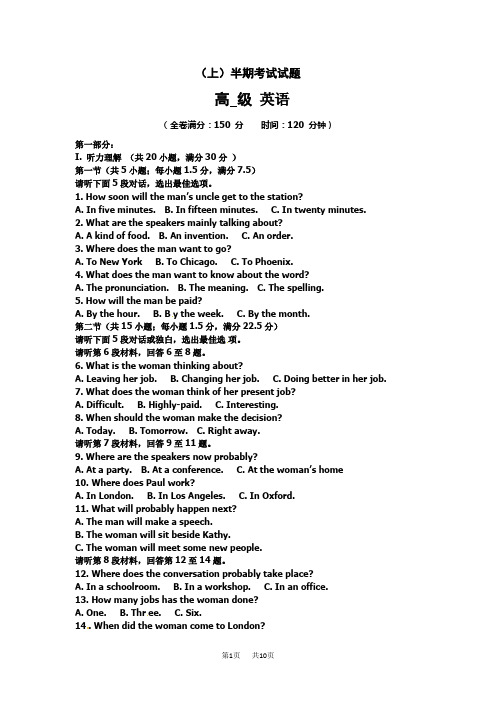
(上)半期考试试题高级英语(全卷满分:150 分时间:120 分钟)第一部分:I. 听力理解(共20小题,满分30分)第一节(共5小题;每小题1.5分,满分7.5)请听下面5段对话,选出最佳选项。
1. How soon will the man’s uncle get to the station?A. In five minutes.B. In fifteen minutes.C. In twenty minutes.2. What are the speakers mainly talking about?A. A kind of food.B. An invention.C. An order.3. Where does the man want to go?A. To New YorkB. To Chicago.C. To Phoenix.4. What does the man want to know about the word?A. The pronunciation.B. The meaning.C. The spelling.5. How will the man be paid?A. By the hour.B. B y the week.C. By the month.第二节(共15小题;每小题1.5分,满分22.5分)请听下面5段对话或独白,选出最佳选项。
请听第6段材料,回答6至8题。
6. What is the woman thinking about?A. Leaving her job.B. Changing her job.C. Doing better in her job.7. What does the woman think of her present job?A. Difficult.B. Highly-paid.C. Interesting.8. When should the woman make the decision?A. Today.B. Tomorrow.C. Right away.请听第7段材料,回答9至11题。
河北省英语高二上册期中同步自测试题班级:________________ 学号:________________ 姓名:______________一、听力题(每题3分)Question 1:You will hear a conversation between a teacher and a student about an upcoming exam.Question: What is the main topic of their conversation?A. Project deadlines.B. Upcoming exam schedule.C. Course requirements.D. Study tips for exams.Answer: BQuestion 2:You will hear a news report about a local event happening in Xinxiang City.Question: What is the purpose of the event?A. To promote tourism.B. To raise awareness about environmental protection.C. To celebrate a cultural festival.D. To fundraise for a charity.Answer: CQuestion 3:Listen to a short dialogue between two friends discussing their weekend plans.Question: Where are they planning to go on Saturday?A. To the library.B. To the cinema.C. To the park for a picnic.D. To the shopping mall.Answer: CQuestion 4:You will hear a short lecture excerpt about the history of English literature. Question: What period of English literature is the speaker focusing on?A. The Renaissance.B. The Victorian Age.C. The Elizabethan Era.D. The Modern Period.Answer: BQuestion 5:Listen to a conversation between a receptionist and a guest at a hotel. Question: What service does the guest request?A. Room service.B. Wake-up call.C. Laundry service.D. Directions to the nearest restaurant.Answer: A二、单选题(每题3分)1.Which of the following is the correct form of the verb “to speak” in the presentcontinuous tense for a singular third-person subject?A. SpeakB. SpeaksC. SpeakingD. Is speakingAnswer: D2.The book_______I borrowed from the library last week is very interesting.A. whichB. whatC. thatD. whereAnswer: C3.He has been living in London for five years, so he is now quite_______with the city.A. familiarB. similarC. differentD. comfortableAnswer: A4.If it_______tomorrow, we’ll go hiking in the mountains.A. won’t rainB. doesn’t rainC. isn’t rainingD. hasn’t rainedAnswer: B5.She insisted that she_______to the party, but she eventually changed her mind.A. wentB. would goC. goD. had goneAnswer: C三、多选题(每题4分)Question 1:Which of the following sentences is grammatically correct?A. The book that I have been reading is very interesting.B. The book I have been reading is very interestingly.C. The book that I am reading are very interesting.D. The books I am reading is very interesting.Answer: AQuestion 2:The teacher advised us_____more time practicing English.A. spendB. to spendC. spendingD. spentAnswer: BQuestion 3:_____ surprised me most was that he could speak five languages.A. ThatB. WhatC. ItD. WhichAnswer: BQuestion 4:He insisted that h e_____the book, but I didn’t believe him.A. had readB. has readC. readD. readsAnswer: AQuestion 5:If I_____you, I would apologize to her immediately.A. amB. wasC. wereD. beAnswer: C四、阅读理解(每题4分)Title: The Benefits of Reading for TeenagersReading has always been considered a valuable activity, and for teenagers, it holds even greater significance. Not only does it expand their vocabularies and improve theirwriting skills, but it also opens doors to new worlds, cultures, and perspectives.In today’s fast-paced digital age, where screens seem to dominate every wakingmoment, encouraging teenagers to pick up a book can seem like a daunting task.However, the benefits far outweigh the initial reluctance. Reading promotes empathy, as it allows readers to step into the shoes of characters, experiencing their joys andsorrows. It nurtures creativity, inspiring young minds to think outside the box andimagine possibilities beyond their immediate surroundings.Moreover, reading is a great stress reliever. Immersing oneself in a good book canprovide a much-needed escape from the pressures of daily life, helping teenagers to relax and recharge. This, in turn, can lead to improved mental health and overallwell-being.Questions:1.What are the primary benefits of reading for teenagers mentioned in the passage?(4 marks)•Answer: Expanding vocabularies, improving writing skills, opening doors to new worlds and perspectives, promoting empathy, nurturing creativity, and providing stress relief.2.How does reading promote empathy among teenagers? (4 marks)•Answer: By allowing readers to step into the shoes of characters and experience their emotions, reading promotes empathy among teenagers.3.What is the significance of reading in today’s digital age? (4 marks)•Answer: In today’s digital age, reading remains significant as it offers a respite from screens, nurtures imagination, and provides benefits such as vocabulary expansion, writing improvement, and stress relief.4.Why is reading considered a great stress reliever for teenagers? (4 marks)•Answer: Reading is considered a great stress reliever for teenagers because it provides an escape from the pressures of daily life, allowing them to relax andrecharge their minds.5.What impact can reading have on teenagers’ mental health and well-being? (4marks)•Answer: Reading can positively impact teenagers’ mental health and well-being by reducing stress levels, promoting relaxation, and nurturing creativity and empathy, all of which contribute to overall emotional and psychological well-being.五、作文(30分)Title: Navigating the Dual Edges of Online Learning Amidst the PandemicAs a student navigating the uncharted waters of senior three amidst the ongoingpandemic, I recently engaged in a thought-provoking debate centered on the pros and cons of online learning. The discourse illuminated both the shimmering facets andshadowy corners of this new educational landscape.On the brighter side, online learning has undeniably offered unparalleled flexibility and accessibility. It has broken geographical barriers, enabling students from remotecorners to access quality education seamlessly. Moreover, the digital platform fosters independence, as self-study becomes a necessity, honing time management andresearch skills. Additionally, the vast array of online resources at our fingertipsenhances learning experiences, catering to diverse learning styles and interests.However, the debate also unearthed several concerns. The lack of face-to-faceinteraction can lead to feelings of isolation and a decline in social skills. Moreover, the distractions of the digital world often hinder concentration, making it challenging tomaintain focus during virtual classes. Furthermore, not all students have equal access to reliable internet or suitable devices, widening the educational divide.In my personal view, online learning, though imperfect, presents a valuable opportunity for adaptation and growth. It necessitates the cultivation of resilience and adaptability, skills that are invaluable in today’s rapidly evolving world. By embracing the positives and mitigating the negatives through strategies such as creating dedicated study spaces, fostering virtual communities, and advocating for equitable access, we can harness the full potential of online learning.Ultimately, the pandemic has forced us to reassess our educational paradigms, and online learning, with its dual edges, stands as a testament to our ability to innovate and overcome challenges. As Li Hua, I am optimistic that by striking a balance between its advantages and disadvantages, we can pave the way for a more inclusive and dynamic educational future.。
河北高二高中英语期中考试班级:___________ 姓名:___________ 分数:___________一、其他第一节语音知识(共5小题;每小题1分,满分5分)从A、B、C、D四个选项中,找出其划线部分与所给单词的划线部分读音相同的选项,并在答题卡上将该项涂黑。
1. envy A. tend B. legal C. declare D. dozen2. resist A. insist B. visual C. prison D. thus3. chief A. machine B. achieve C. chemistry D. Christmas4. patent A. many B. vast C. storage D. arrow5. rely A. candy B. supply C. lorry D. worthy二、单项选择1.We have every reason to believe that ______ 2010 World Expo in Shanghai will be ______success.A.the; a B.the; /C./; a D.a; a2.—Where is that report?—I brought it to you _______ you were in Mr. Black’s office yesterday.A.if B.because C.when D.before3.She will have to ______ herself to the new condition.A.change B.fit C.suit D.adjust4.A 3G mobile phone, ______to be most useful and fashionable, is popular with some teenagers.A.consider B.considering C.considered D.to be considered5.______ all my homework unfinished, I am not allowed to go online to play games.A. AsB. ForC. WithoutD. With11. The lift ______ and we were trapped inside it.A. broke downB. broke upC. broke outD. broke in6.— David, keep ______ in mind that you have to be home by 10 o'clock.— OK, Mom, I will.A.it B.me C.this D.one7.—I’ve told Nancy many times about the meeting, but she still forget it!—I understand. Actually, anyone ______ be very forgetful at times.A.must B.should C.ought to D.can8.They will fly to Washington, ______they plan to stay for two or three days.A.which B.where C.there D.when9.— May I remind you that a Mr. Smith is waiting outside, sir?—Oh, that’s right. I ______ about it.A.forget B.forgot C.had forgotten D.have forgotten 10.—Tom, you are smoking again?—______? It’s none of your business.A.So what B.How come C.Why not D.What for11.—Have you found the problem with the computer ?—Sorry. It ______ .A.is checked B.is being checked C.has checked D.was being checked 12.— How was your job interview?—Oh, I couldn’t feel ______. I hardly found proper answers to most of the questions they asked.A.better B.easier C.worse D.happier13.Only when class began ______that he had left his book at home.A.will he realize B.he did realize C.did he realize D.had he realized14.It ______ last night ______ Tom saw an interesting film in Dongfeng Cinema.A.is; that B.was; that C.was; which D.was; who三、完形填空第三节完型填空(共20小题;每小题1.5分,满分30分)阅读下面短文,从短文后各题所给的四个选项(A、B、C、D)中,选出可以填入空白处的最佳选项,并在答题卡上将该项涂黑。
河北高二高中英语期中考试班级:___________ 姓名:___________ 分数:___________一、其他1..第一节语音知识(共5小题;每小题1分,满分5分)从A、B、C、D四个选项中,找出其划线部分与所给单词的划线部分读音相同的选项,并在答题卡上将该项涂黑。
1. calm A. half B. altogether C. false D. talk2. recover A. recent B. prevent C. fever D. convenient3. lack A. dance B. exact C. cigarette D. courage4. chest A. chemistry B. machine C. cheese D. Christmas5. ink A. singer B. change C. exchange D. danger2..第二节根据对话内容,从对话后的选项中选出能填入空白处的最佳选项,并在答题卡上将该项涂黑。
选项中有两项为多余选项。
—What can I do for you, sir?—I bought this mobile last Saturday here in your shop. 61—What’s the matter with it?— 62—How long does it last?—I t can last only one day! Then, I’ll have to recharge it. Sometimes it just turns off by itself.—It doesn’t seem to matter much. 63—I’d like you to return the money.— 64 . We can repair the mobile for you.—No, I hope you can change it for a new one of the same model at least.—All right. 65A.I’m sorry, but we can’t.B.But it doesn’t work well.C.Is there anything wrong?D.So what do you want us to do?E. The battery doesn’t last long.F. We can change it for another one.G. All right, don’t worry.二、单项选择1..Will you spare me a few minutes now?。
河北省2021-2021高二英语上学期期中试题第一局部听力〔共两节,总分值30分〕做题时,先将答案标在试卷上。
录音内容结束后,你将有两分钟的时间将试卷上的答案转涂到答题卡上。
第一节〔共5小题;每题1.5分,总分值7.5分〕听下面5段对话。
每段对话后有一个小题,从题中所给的A、B、C三个选项中选出最正确选项,并标在试卷的相应位置。
听完每段对话后,你都有10秒钟的时间来答复有关小题和阅读下一小题。
每段对话仅读一遍。
1. What will the man do next?A. Turn off the TV.B. Watch a movie.C. Study with the woman.2. What does the woman think of her flat?A. Big.B. Expensive.C. Convenient.3. Why won’t the man climb the mountain?A. He worries about the weather.B. He prefers other exercises.C. He doesn’t feel well.4. What are the speakers talking about?A. A film.B. A lecture.C. A concert.5. Where does the conversation probably take place?A. In a workshop.B. In a stadium.C. On a motorbike.第二节〔共15小题;每题1.5分,总分值22.5分〕听下面5段对话或独白。
每段对话或独白后有几个小题,从题中所给的A、B、C三个选项中选出最正确选项,并标在试卷的相应位置。
听每段对话或独白前,你将有时间阅读各个小题,每题5秒钟;听完后,各小题将给出5秒钟的作答时间。
每段对话或独白读两遍。
大厂回民中学2015-2016学年高二第一学期期中考试英语试卷注意:1、本试卷分第Ⅰ卷(选择题)和第Ⅱ卷(非选择题)两部分,满分150 分。
考试时间:120分钟。
答卷前,考生务必将自己的姓名和考号填写或填涂在答题卷指定的位置。
2、选择题答案用2B铅笔把答题卡上对应题目的答案标号涂黑;如需改动,用橡皮擦干净后,再选涂其他答案;不能答在试题卷上。
3、主观题必须用黑色字迹的钢笔或签字笔在答题卷上作答,答案必须写在答题卷各题目指定区域内的相应位置上,超出指定区域的答案无效;如需改动,先划掉原来的答案,然后再写上新的答案。
第Ⅰ卷第一部分听力(共两节,满分30分)第一节(共5小题;每小题1.5分,满分7.5分)听下面5段对话。
每段对话后有一个小题,从题中所给的A、B、C三个选项中选出最佳选项,并标在试卷的相应位置。
听完每段对话后,你都有10秒钟的时间来回答有关小题和阅读下一小题。
每段对话仅读一遍。
1.What does the man want to tell the woman?A. She would help with the repair workB. She should choose another wayC. Her bus has gone wrong2. What does the woman think of the movie?A. Very interestingB. Very badC. Very moving3. Who might have taken the boy’s dictionary?A. JaneB. MikeC. Helen4. What are they talking about?A. Building a toy factory.B. Visiting AmericaC. Bill’s wife5. What has happened?A.A dog was killed.B. The man was injuredC. The man’s car was damaged第二节(共15小题;每小题1.5分,满分22.5分)听下面5段对话或独白。
每段对话或独白后有几个小题,从题中所给的A、B、C三个选项中选出最佳选项,并标在试卷的相应位置。
听每段对话或独白前,你将有时间阅读各个小题,每小题5秒钟;听完后,各小题将给出5秒钟的作答时间。
每段对话或独白读两遍。
听第6段材料,回答第6~7题。
6.What do we know about Mr. Hunter?A.He is in his hometown nowB.He knows the owner of the walletC.He lost the wallet yesterday.7.What will they do next?A.Give the wallet to Mr. Hunter.B.Go to Mr. Hunter’s home.C.Put up a notice.听第7段材料,回答8-9题。
8.What is the man doing now?A. Having dinner.B. Cleaning a meeting room.C. Preparing for a meeting..9. Whose office does the man have to clean?A. Mr. Brown’sB. The manager’sC. His own..听第8段材料,回答第10-12题。
10. How many children does the woman have?A. Only a daughterB. A son and a daughterC. Two sons11. Where does the man’s sister live n ow?A. In Seattle.B. In CaliforniaC. In Washington.12. What might happen next year?A. The man’s sister will move her home.B. The man’s sister will buy another farm.C. The man will go and see his sister.听第9段材料,回答第13-16题。
13 How old is Alice’s grandfather?A. 83B. 79C. 73.14. Who owns a bookstore?A. Alice’s father.B. Alice’s grandmotherC. Alice’s brother..15. What do we know about Alice’s grandmother?A. She was a college teacher.B. She has poor eyesight now.C. She gave up teaching last year.16. Where is probably Alice now?A. At homeB. At schoolC. In a hospital.听第10段材料,回答第17-20题。
17. What does the long holiday offer to people?A. A new way to live and work.B. A long time to deal with difficulties.C. A chance to do different things.18. Which of the following can NOT be achieved during the long holiday?A. Taking intensive courses.B. Becoming an expert at something new.C. Learning to cook.19. What is the adva ntage of most national parks?A. People can take sports there.B. They provide privacy.C. People can rent cabins there.20. How long do some organizations offer intensive courses?A. Two days.B. Three days.C. Two or three days.第二部分英语知识应用第一节:单项填空(共10小题;每小题1分,满分10分)从题中所给的A、B、C、D四个选项中,选出可以填入空格的最佳选项。
21. I________ along the street looking for a place to park when the accident________. A.went; was occurring B.went;occurredC.was going; occurred D.was going; had occurred22. ________ the delayed flight will take off depends much on the weather.A.Why B.When C.That D.What23. ________by curiosity,he opened his wife’s notebook and began reading her diary. A.Driving B.Being driven C.Driven D.Having driven24. His first book ______ last month is based on a true story.A.published B.to be publishedC.to publish D.being published25. Not until all the fish died in the river ________ how serious the pollution was. A.did the villagers realizeB.the villagers realizedC.the villagers did realizeD.didn't the villagers realize26. _______ its low price, the advantage of this car lies in its good quality.A. Instead ofB. Regardless ofC. Apart fromD. As from27.Yesterday I went to see him, _________ that he had gone abroad two days before.A. only to learnB. to learn onlyC. only learnedD. only learning28. — Why are your hands that dirty?— Oh, I______ in the garden since we finished breakfast.A. workedB. was workingC. am workingD. have been working29. My computer is out of _________ order all of a sudden. Could you do me________ favor and type the plan for me right now?A. the; aB. the; 不填C. 不填; aD. 不填; 不填30. After he got in touch with the Red Cross, Mr. Green ______ helping homeless women and children to a safe place.A. set outB. set aboutC. set offD. set down第二节阅读理解(共15小题;每小题2分,满分30分)阅读下列短文,从每题所给的选项中,选出最佳选项,并在题卡上将该项涂黑.AAs Internet users become more dependent on the Internet to store information, are people remember less? If you know your computer will save information, why store it in your own personal memory, your brain? Experts are wondering if the Internet is changing what we remember and how.In a recent study, Professor Betsy Sparrow conducted some experiments. She and her research team wanted to know the Internet is changing memory. In the first experiment, they gave people 40 unimportant facts to type into a computer. The first group of people understood that the computer would save the information. The second group understood that the computer would not save it. Later, the second group remembered the information better. People in the first group knew they could find the information again, so they did not try to reme mber it.In another experiment, the researchers gave people facts to remember, and told them where to find the information on the Internet. The information was in a specific computer folder (文件夹). Surprisingly, people later remember the folder location (位置) better than the facts. When people use the Internet, they do not remember the information. Rather, they remember how to find it. This is called “transactive memory (交互记忆).”According to Sparrow, we are not becoming people with poor memories as a result of the Internet. Instead, computer users are developing stronger transactive memories; that is, people are learning how to organize huge quantities of informatio n so that they are able to access it at a later date. This doesn’t mean we are becoming either more or less intelligent, but there is no doubt that the way we use memory is changing.31. The passage begins with two questions to ______.A. introduce the main topicB. show th e author’s altitudeC. describe how to use the InternetD. explain how to store information32. In transactive memory, people ______.A. keep the information in mindB. change the quantity of informationC. organize information like a computerD. remember how to find the information33. What is the effect of the Internet according to Sparrow’s research?A. We are using memory differently.B. We are becoming more intelligent.C. We have poorer memories than before.D. We need a better way to access information.BPapa, as a son of a dirt-poor farmer, left school early and went to work in a factory, for education was for the rich then. So, the world became his school. With great interest, he read everything he could lay his hands on, listened to the town elders and learned about th e world beyond his tiny hometown. “There’s so much to learn,” he’d say. “Though we’re born stupid, only the stupid remain that way.” He was determined that none of his children would be denied (拒绝) an education.Thus, Papa insisted that we learn at least one new thing each day. Though, as children, we thought this was crazy, it would never have occurred to us to deny Papa a request. And dinner time seemed perfect for sharing what we had learned. We would talk about the news of the day; no matter how insignificant, it was never taken lightly. Papa would listen carefully and was ready with some comment, always to the point.Then came the moment —the time to share the day’s new learning.Papa, at the head of the table, would push back his chair and pour a glass of red wine, ready to listen.“Felice,” he’d say, “tell me what you learned today.”“I learned that the population of Nepal is ...”Silence.Papa was thinking about what was said, as if the salvation (拯救) of the world would depend upon it. “The population of Nepal. Hmm. Well . . . ” he’d say. “Get the map; let’s see where Nepal is.” And the whole family w ent on a search for Nepal.This same experience was repeated until each family member had a turn. Dinner ended only after we had a clear understanding of at least half a dozen such facts.As children, we thought very little about these educational wonders. Our family, however, was growing together, sharing experiences and participating in one another’s education.And by looking at us, listening to us, respecting our input, affirming (肯定) our value, giving us a sense of dignity, Papa was unquestionably our most influential teacher.Later during my training as a future teacher, I studied with some of the most famous educators. They were imparting (传授) what Papa had known all along —the value of continual learning. His technique has served me well all my life. Not a single day has been wasted, th ough I can never tell when knowing the population of Nepal might prove useful.34. The underlined word “it” in the second paragraph refers to “________”A. one new thingB. a requestC. the newsD. some comment35. It can be learned from the passage that the author ________.A. enjoyed talking about newsB. knew very well about NepalC. felt regret about those wasted daysD. appreciated his father’s educational technique36. What is the greatest value of “dinner time” to the author?A. Continual learning.B. Showing talents.C. Family get-together.D. Winning Papa’s approval.37. The author’s father can be best described as________.A. an educator expert at training future teachersB. a parent insistent on his children’s educationC. a participant willing to share his knowledgeD. a teacher strict about everything his students didCHorror seized the heart of the World War I soldier as he saw his life-long friend fall in the battle. Caught in a trench(战壕)with continuous gunfire whizzing over his head, the soldier asked his commander if he might go out into the “No Man’s Land” between the trenches to bring his fallen comrade back.“You can go,” said the commander, “but I don’t think it will be worth it. Your friend is probably dead and you may throw your own life away.” The commander’s words didn’t matter, and the soldier went anyway.To one’s surprise, he managed to reach his friend, raised him onto his shoulder, and brought him back to their company’s trench. As the two of them fell in together to the bottom of the trench, the officer checked the wounded soldier, and then looked kindly at his friend. “I told you it wouldn’t be worth it,” he said. “Your friend is dead, and your wound is deadly.” “It was worth it, though, sir.” the soldier said. “How do you mean ‘worth it’?” responded the commander. “Your friend is dead!” “Yes, sir.” thesoldier answered. “But it was worth it because when I got to him, he was still alive, and I had the satisfaction of hearing him say, ‘Jim, I knew yo u’d come.’”Many a time in life, whether a thing is worth doing or not really depends on how you look at it. Take up all your courage and do something your heart tells you to do so that you may not regret not doing it later in life.38. What’s the commander’s attitude towards the soldier’s saving his friend?A. Positive.B. Negative.C. Neutral.D. Supportive.39. The phrase “No Man’s Land” most probably means “ ” in the passage.A. the area where there is no manB. a bare wasteland which can’t be usedC. an unoccupied area between opposing armiesD. the area on the court between the base line and the service line40. According to the soldier, why did he say “It was worth it.”?A. Because the soldier saved his friend in time.B. Because the soldier successfully brought his friend back.C. Because what he did will bring him great honor and make him get promoted in his later life.D. Because his friend was still alive when he reached him and he didn’t make his friend disappointed.DEasy Ways to Keep Your Brain SharpEveryone is forgetful, but as we age, we start to feel like our brains are slowing down a bit---and that can be a very annoying thing. 41 Read on for some techniques worth trying.1. 42People who regularly made plans and looked forward to upcoming events had a 50 percent reduced chance of Alzheimer's disease (早老性痴呆症), according to a re cent study. 43 Something as simple as setting a goal to have a weekly coffee date with a friend will do. There's evidence that people who have a purpose in life or who are working on long or short-term goals appear to do better. In other words, keep your brain looking forward.2. Go for a walk.Mildly raised glucose (葡萄糖) levels can harm the area of the brain that helps you form memories and physical activity can help get blood glucose down to normal levels. In fact, exercise produces chemicals that are good for your brain. 443. Learn something new.Take a Spanish class online, join a drawing club, or learn to play cards. A study found that mental stimulation (刺激) limits the weakening effects of aging on memory and the mind. But the best thing for your brain is when you learn something new and are physically activeat the same time. 45 ,or going dancing with your friends.A. It should be something like learning gardening.B. This can be especially harmful to the aged.C. Focus on the future.D. So take a few minutes each day to do some reading.E. In other words, when you take care of your body, you take care of your brain.F. But don't worry if your schedule isn't filled with life-changing events.G. Luckily, research shows there is a lot you can do to avoid those moments.第三节完形填空(共20小题;每小题1.5分,满分30分)阅读下面短文,从短文后各题所给的A、B、C、D四个选项中,选出最佳选项。